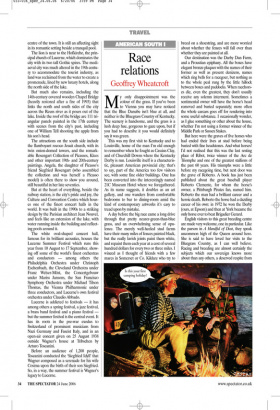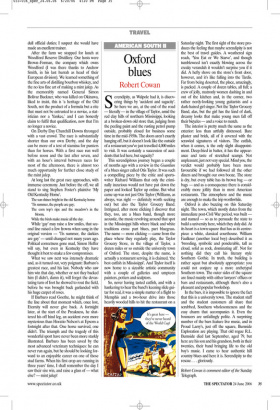Race relations
Geoffrey Wheatcroft
My only disappointment was the colour of the grass. If you’ve been to Vienna you may have noticed that the Blue Danube isn’t blue at all, and neither is the Bluegrass Country of Kentucky. The scenery is handsome, and the grass is a lush deep hue, gorgeous to gaze upon, but if you had to describe it you would definitely say it was green.
This was my first visit to Kentucky and to Louisville, home of the man I’m old enough to remember when he fought as Cassius Clay, and of Churchill Downs where the Kentucky Derby is run. Louisville itself is a characteristic, pleasant American provincial city; that’s to say, part of the America too few visitors see, with some fine older buildings. One has been converted into the interestingly named 21C Museum Hotel where we foregathered. As its name suggests, it doubles as an art gallery, and one wanders from comfortable bedrooms to bar to dining-room amid the kind of contemporary artworks it’s easy to tread upon by mistake.
A day before the big race came a long drive through that pretty nearer-green-than-blue grass, and an overwhelming sense of opulence. The merely well-heeled stud farms have their many miles of fences painted black, but the really lavish joints paint them white, and repaint them each year at a cost of several hundred dollars for every two or three miles. I winced as I thought of friends with a few mares in Somerset or Co. Kildare who try to breed on a shoestring, and are more worried about whether the fences will fall over than whether they are painted at all.
Our destination was the Darby Dan Farm, and a Proustian epiphany. All the boxes have elegant bronze plaques with the names of their former as well as present denizens, names which ring bells for a racegoer, but nothing as to the whole peal rung by the little hillock between boxes and paddocks. When racehorses die, even the greatest, they don’t usually receive any solemn interment. Sometimes a sentimental owner will have the horse’s head removed and buried separately; more often the whole carcass goes off for rendering into some useful substance. I occasionally wonder, as I glue something or other about the house, whether I’m not using a former winner of the Middle Park or Sussex Stakes.
But here were the graves of five horses who had ended their lives at stud before being buried with fine headstones. And what horses! I’d not realised that this was the last resting place of Ribot, twice winner of the Arc de Triomphe and one of the greatest stallions of the past 60 years. His triumphs were a little before my racegoing time, but next door was the grave of Roberto. A book has just been published about the great baseball player Roberto Clemente, for whom the horse’s owner, a Pittsburgh Pirates fan, named him. Roberto the man had a brilliant career and a heroic death. Roberto the horse had a dazzling career of his own: in 1972 he won the Derby (ours, at Epsom) and then at York became the only horse ever to beat Brigadier Gerard.
English visitors to this great breeding centre are made very welcome, one in particular. Like the parson in A Handful of Dust, they speak uncommon high of the Queen around here. She is said to have loved her visits to the Bluegrass Country, as I can well believe. Racing and breeding are almost certainly the subjects which our sovereign knows more about than any others, a deserved respite from dull official duties; I suspect she would have made an excellent trainer.
After the farm we stopped for lunch at Woodford Reserve Distillery. Our hosts were Brown–Forman, the company which owns Woodford (I was there thanks to Andrew Smith, in his last hurrah as head of their European division). We learned something of the fine arts of distilling bourbon whiskey, and the no less fine art of making a mint julep. As the memorably named General Simon Bolivar Buckner, who was killed on Okinawa, liked to insist, this is ‘a heritage of the Old South, not the product of a formula but a rite that must not be entrusted to a novice, a statistician nor a Yankee,’ and I can honestly claim to fulfil that qualification, now that I’m no longer a novice.
On Derby Day Churchill Downs thronged with a vast crowd. The race is substantially shorter than our own Derby, and the day can be more of a test of stamina for punters than for horses. With a first race run well before noon and the last after seven, and with an hour’s interval between races for most of the afternoon, there is almost too much opportunity for further close study of the mint julep.
At long last the great race approaches, with immense ceremony. Just before the off, we all stand to sing Stephen Foster’s plaintive ‘My Old Kentucky Home’.
The sun shines bright in the old Kentucky home ’Tis summer, the people are gay; The corn top’s ripe and the meadow’s in the bloom, While the birds make music all the day.
While ‘gay’ may raise a few smiles, that second line raised a few frowns when sung in the original version — ’Tis summer, the darkies are gay’ — until changed not many years ago. Political correctness gone mad, Simon Heffer will say, but even in Kentucky they have thought it best to make a few compromises.
What we saw next was intensely dramatic and, as it turned out, very poignant: Barbaro’s greatest race, and his last. Nobody who saw him win that day, whether or not they backed him (I didn’t, damn it), will forget the devastating turn of foot he showed to rout the field, before he was brought back garlanded with his huge carpet of roses.
If Barbaro read Goethe, he might think of the line about that moment which, once lost, Eternity will never give back. A fortnight later, at the start of the Preakness, he shattered his off hind leg, an accident even more mysterious than Horatio Nelson’s at Epsom a fortnight after that. One horse survived, one didn’t. The triumph and the tragedy of this wonderful sport have never been more starkly illustrated. Barbaro has been saved by the most advanced veterinary techniques: he can never run again, but he should be looking forward to an enjoyable career on one of those stud farms. When his first crop are running in three years’ time, I shall remember the day I saw their sire win, and raise a glass of — what else? — mint julep!




















































 Previous page
Previous page